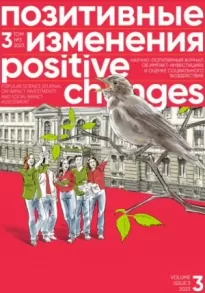Позитивные изменения. Том 3, № 3 (2023). Positive changes. Volume 3, Issue 3 (2023)

- Автор: Редакция журнала «Позитивные изменения»
- Жанр: Научная литература / Газеты и журналы
- Дата выхода: 2023
Читать книгу "Позитивные изменения. Том 3, № 3 (2023). Positive changes. Volume 3, Issue 3 (2023)"
MODEL 1: “UNIVERSITY + LOCAL COMMUNITY”
This model essentially revolves around fostering a close-knit collaboration between universities and local communities to address social issues and enhance quality of life.
The “University + Local Community” model is based on the following principles:
1. Collaboration. Universities and local communities collaborate, sharing knowledge and expertise to identify and implement innovative solutions to societal challenges.
2. Reciprocity. This partnership yields benefits for both universities and local communities. Universities can enhance their academic curricula, undertake research projects, and acquire fresh insights through real-world engagement, while local communities, on the other hand, gain access to innovative solutions and expertise produced by the universities.
3. Local Focus. The “University + Local Community” model centers on resolving specific challenges confronting local communities. Universities assess the needs and priorities of these communities to make sure their social innovations are both pertinent and effective.
Illustrations of practices aimed at cultivating social innovation within the “University + Local Community” model may encompass joint initiatives such as social entrepreneurship centers, community research endeavors, or training programs tailored to devising innovative solutions for local communities.
University of Manchester is one example of this model in action. It places great emphasis on social innovation within its social responsibility framework, a program carried out by a dedicated unit within the university structure. Students are also encouraged to join the undertaking via a specialized program for the undergraduates, known as Stellify.[143] This program encourages students to chart their individual course of action by implementing social service initiatives and developing themselves within the public sector. It outlines three primary avenues for development.
Firstly, the University College for Interdisciplinary Learning (UCIL) offers a plethora of courses addressing various issues and aspects of social life, which the students can incorporate into their personalized educational journeys. The courses catalog is updated regularly and currently features over 30 disciplines spanning subjects such as climate change, mental health, entrepreneurial mindset, leadership, many more.
In addition to offering an interdisciplinary education program, the college also administers the Manchester Leadership Programme (MLP), aimed at developing students’ leadership qualities.[144] What sets this program apart is that eligible students must not only complete the leadership education program provided by the college but also to actively engage in volunteer activities, with 15, 25, or 40 hours of volunteer service in the local NGOs.
Second, students can also participate in Ethical Grand Challenges as part of the Stellify program. This program is a regular meetup of teams made up of students from different departments. The young people work together to create their solutions in three areas: Sustainability Challenge, Social Justice Challenge, and Workplace Ethics Challenge. Each Challenge is only available to students in a particular year of study. To qualify for a Stellify Award, the candidate must participate in all three programs.
Third, the Stellify program requires the participants to participate in volunteer work. To coordinate volunteer activities within the university structure, a “volunteer hub”[145] was established. It is a dedicated resource for finding volunteer work opportunities, where organizations can offer tasks and students can take advantage of them.
The fourth and final component of the program is the realization of leadership potential. Students are required to show leadership at least twice during their undergraduate experience. The list of roles includes 15 positions, including peer mentor, PASS (Peer Assisted Study Sessions), leader, student representative (responsible for collecting regular feedback from students), etc.
Thus, cooperation with the local NGOs for the implementation of the above program components, is organically built into the student development program throughout the entire process of studying at the university.





